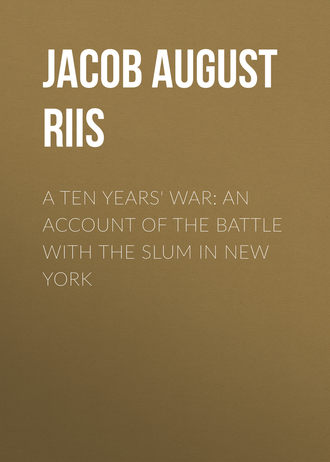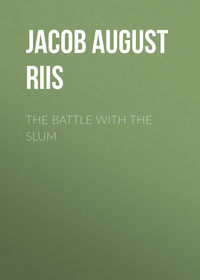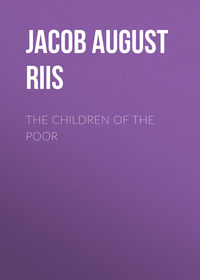 полная версия
полная версияA Ten Years' War: An Account of the Battle with the Slum in New York

Jacob A. Riis
A Ten Years' War: An Account of the Battle with the Slum in New York
I
THE BATTLE WITH THE SLUM
The slum is as old as civilization. Civilization implies a race, to get ahead. In a race there are usually some who for one cause or another cannot keep up, or are thrust out from among their fellows. They fall behind, and when they have been left far in the rear they lose hope and ambition, and give up. Thenceforward, if left to their own resources, they are the victims, not the masters, of their environment; and it is a bad master. They drag one another always farther down. The bad environment becomes the heredity of the next generation. Then, given the crowd, you have the slum ready-made.
The battle with the slum began the day civilization recognized in it her enemy. It was a losing fight until conscience joined forces with fear and self-interest against it. When common sense and the golden rule obtain among men as a rule of practice, it will be over. The two have not always been classed together, but here they are plainly seen to belong together. Justice to the individual is accepted in theory as the only safe groundwork of the commonwealth. When it is practiced in dealing with the slum, there will shortly be no slum. We need not wait for the millennium, to get rid of it. We can do it now. All that is required is that it shall not be left to itself. That is justice to it and to us, since its grievous ailment is that it cannot help itself. When a man is drowning, the thing to do is to pull him out of the water; afterward there will be time for talking it over. We got at it the other way in dealing with our social problems. The doctrinaires had their day, and they decided to let bad enough alone; that it was unsafe to interfere with "causes that operate sociologically," as one survivor of these unfittest put it to me. It was a piece of scientific humbug that cost the age which listened to it dear. "Causes that operate sociologically" are the opportunity of the political and every other kind of scamp who trades upon the depravity and helplessness of the slum, and the refuge of the pessimist who is useless in the fight against them. We have not done yet paying the bills he ran up for us. Some time since we turned to, to pull the drowning man out, and it was time. A little while longer, and we should have been in danger of being dragged down with him.
The slum complaint had been chronic in all ages, but the great changes which the nineteenth century saw, the new industry, political freedom, brought on an acute attack which threatened to become fatal. Too many of us had supposed that, built as our commonwealth was on universal suffrage, it would be proof against the complaints that harassed older states; but in fact it turned out that there was extra hazard in that. Having solemnly resolved that all men are created equal and have certain inalienable rights, among them life, liberty, and the pursuit of happiness, we shut our eyes and waited for the formula to work. It was as if a man with a cold should take the doctor's prescription to bed with him, expecting it to cure him. The formula was all right, but merely repeating it worked no cure. When, after a hundred years, we opened our eyes, it was upon sixty cents a day as the living wage of the working-woman in our cities; upon "knee pants" at forty cents a dozen for the making; upon the Potter's Field taking tithe of our city life, ten per cent, each year for the trench, truly the Lost Tenth of the slum. Our country had grown great and rich; through our ports was poured food for the millions of Europe. But in the back streets multitudes huddled in ignorance and want. The foreign oppressor had been vanquished, the fetters stricken from the black man at home; but his white brother, in his bitter plight, sent up a cry of distress that had in it a distinct note of menace. Political freedom we had won; but the problem of helpless poverty, grown vast with the added offscourings of the Old World, mocked us, unsolved. Liberty at sixty cents a day set presently its stamp upon the government of our cities, and it became the scandal and the peril of our political system.
So the battle began. Three times since the war that absorbed the nation's energies and attention had the slum confronted us in New York with its challenge. In the darkest days of the great struggle it was the treacherous mob; later on, the threat of the cholera, which found swine foraging in the streets as the only scavengers, and a swarming host, but little above the hog in its appetites and in the quality of the shelter afforded it, peopling the back alleys. Still later, the mob, caught looting the city's treasury with its idol, the thief Tweed, at its head, drunk with power and plunder, had insolently defied the outraged community to do its worst. There were meetings and protests. The rascals were turned out for a season; the arch-thief died in jail. I see him now, going through the gloomy portals of the Tombs, whither, as a newspaper reporter, I had gone with him, his stubborn head held high as ever. I asked myself more than once, at the time when the vile prison was torn down, whether the comic clamor to have the ugly old gates preserved and set up in Central Park had anything to do with the memory of the "martyred" thief, or whether it was in joyful celebration of the fact that others had escaped. His name is even now one to conjure with in the Sixth Ward. He never "squealed," and he was "so good to the poor"—evidence that the slum is not laid by the heels by merely destroying Five Points and the Mulberry Bend. There are other fights to be fought in that war, other victories to be won, and it is slow work. It was nearly ten years after the great robbery before decency got the upper grip in good earnest. That was when the civic conscience awoke in 1879.
In that year the slum was arraigned in the churches. The sad and shameful story was told of how it grew and was fostered by avarice, that saw in the homeless crowds from over the sea only a chance for business, and exploited them to the uttermost, making sometimes a hundred per cent, on the capital invested,—always most out of the worst houses, from the tenants of which "nothing was expected" save that they pay the usurious rents; how Christianity, citizenship, human fellowship, shook their skirts clear of the rabble that was only good enough to fill the greedy purse, and how the rabble, left to itself, improved such opportunities as it found after such fashion as it knew; how it ran elections merely to count its thugs in, and fattened at the public crib; and how the whole evil thing had its root in the tenements, where the home had ceased to be sacred,—those dark and deadly dens in which the family ideal was tortured to death, and character was smothered; in which children were "damned rather than born" into the world, thus realizing a slum kind of foreordination to torment, happily brief in many cases. The Tenement House Committee long afterward called the worst of the barracks "infant slaughter houses," and showed, by reference to the mortality lists, that they killed one in every five babies born in them.
The story shocked the town into action. Plans for a better kind of tenement were called for, and a premium was put on every ray of light and breath of air that could be let into it. Money was raised to build model houses, and a bill to give the health authorities summary powers in dealing with tenements was sent to the legislature. The landlords held it up until the last day of the session, when it was forced through by an angered public opinion. The power of the cabal was broken. The landlords had found their Waterloo. Many of them got rid of their property, which in a large number of cases they had never seen, and tried to forget the source of their ill-gotten wealth. Light and air did find their way into the tenements in a half-hearted fashion, and we began to count the tenants as "souls." That is one of our milestones in the history of New York. They were never reckoned so before; no one ever thought of them as "souls." So, restored to human fellowship, in the twilight of the air shaft that had penetrated to their dens, the first Tenement House Committee was able to make them out "better than the houses" they lived in, and a long step forward was taken. The Mulberry Bend, the wicked core of the "bloody Sixth Ward," was marked for destruction, and all slumdom held its breath to see it go. With that gone, it seemed as if the old days must be gone too, never to return. There would not be another Mulberry Bend. As long as it stood, there was yet a chance. The slum had backing, as it were.
The civic conscience was not very robust yet, and required many and protracted naps. It slumbered fitfully eight long years, waking up now and then with a start, while the politicians did their best to lull it back to its slumbers. I wondered often, in those years of delay, if it was just plain stupidity that kept the politicians from spending the money which the law had put within their grasp; for with every year that passed a million dollars that could have been used for small park purposes was lost. But they were wiser than I. I understood when I saw the changes which letting in the sunshine worked. We had all believed it, but they knew it all along. At the same time, they lost none of the chances that offered. They helped the landlords, who considered themselves greatly aggrieved because their property was thereafter to front on a park instead of a pigsty, to transfer the whole assessment of half a million dollars for park benefit to the city. They undid in less than six weeks what it had taken considerably more than six years to do; but the park was cheap at the price. We could afford to pay all it cost to wake us up. When finally, upon the wave of wrath excited by the Parkhurst and Lexow disclosures, reform came with a shock that dislodged Tammany, it found us wide awake, and, it must be admitted, not a little astonished at our sudden access of righteousness.
The battle went against the slum in the three years that followed, until it found backing in the "odium of reform" that became the issue in the municipal organization of the greater city. Tammany made notes. Of what was done, how it was done, and why, during those years, I shall have occasion to speak further in these pages. Here I wish to measure the stretch we have come since I wrote "How the Other Half Lives," ten years ago. Some of it we came plodding, and some at full speed; some of it in the face of every obstacle that could be thrown in our way, wresting victory from defeat at every step; some of it with the enemy on the run. Take it altogether, it is a long way. Most of it will not have to be traveled over again. The engine of municipal progress, once started as it has been in New York, may slip many a cog with Tammany as the engineer; it may even be stopped for a season; but it can never be made to work backward. Even Tammany knows that, and is building the schools she so long neglected, and so is hastening the day when she shall be but an unsavory memory.
How we strove for those schools, to no purpose! Our arguments, our anger, the anxious pleading of philanthropists who saw the young on the East Side going to ruin, the warning year after year of the superintendent of schools that the compulsory education law was but an empty mockery where it was most needed, the knocking of uncounted thousands of children for whom there was no room,—uncounted in sober fact; there was not even a way of finding out how many were adrift,—brought only the response that the tax rate must be kept down. Kept down it was. "Waste" was successfully averted at the spigot; at the bunghole it went on unchecked. In a swarming population like that you must have either schools or jails, and the jails waxed fat with the overflow. The East Side, that had been orderly, became a hotbed of child crime. And when, in answer to the charge made by a legislative committee that the father forced his child into the shop, on a perjured age certificate, to labor when he ought to have been at play, that father, bent and heavy-eyed with unceasing toil, flung back the charge with the bitter reproach that we gave him no other choice, that it was either the street or the shop for his boy, and that perjury for him was cheaper than the ruin of the child, we were mute. What, indeed, was there to say? The crime was ours, not his. That was but yesterday. To-day we can count the months to the time when every child who knocks shall find a seat in our schools. We have a school census to tell us of the need. In that most crowded neighborhood in all the world, where the superintendent lately pleaded in vain for three new schools, five have been built, the finest in this or any other land,—great, light, and airy structures, with playgrounds on the roof; and all over the city the like are going up. The briefest of our laws, every word of which is like the blow of a hammer driving the nails home in the coffin of the bad old days, says that never one shall be built without its playground. So the boy is coming to his rights.
The streets are cleaned,—not necessarily clean just now; Colonel Waring is dead, with his doctrine of putting a man instead of a voter behind every broom, killed by politics, he and his doctrine both,—but cleaned. The slum has even been washed. We tried that on Hester Street years ago, in the age of cobblestone pavements, and the result fairly frightened us. I remember the indignant reply of a well-known citizen, a man of large business responsibility and experience in the handling of men, to whom the office of street-cleaning commissioner had been offered, when I asked him if he would accept. "I have lived," he said, "a blameless life for forty years, and have a character in the community. I cannot afford—no man with a reputation can afford—to hold that office; it will surely wreck it." That was then. It made Colonel Waring's reputation. He took the trucks from the streets. Tammany, in a brief interregnum of vigor under Mayor Grant, had laid the axe to the unsightly telegraph poles and begun to pave the streets with asphalt, but it left the trucks and the ash barrels to Colonel Waring as hopeless. Trucks have votes; at least their drivers have. Now that they are gone, the drivers would be the last to bring them back; for they have children, too, and the rescued streets gave them their first playground. Perilous, begrudged by policeman and storekeeper, though it was, it was still a playground.
But one is coming in which the boy shall rule unchallenged. The Mulberry Bend Park kept its promise. Before the sod was laid in it two more were under way in the thickest of the tenement house crowding, and each, under the law which brought them into existence, is to be laid out in part as a playground. They are not yet finished, but they will be; for the people have taken to the idea, and the politician has made a note of the fact. He saw a great light when the play piers were opened. In half a dozen localities where the slum was striking its roots deep into the soil such piers are now being built, and land is being acquired for small parks. We shall yet settle the "causes that operated sociologically" on the boy with a lawn mower and a sand heap. You have got your boy, and the heredity of the next one, when you can order his setting.
Even while I am writing, a bill is urged in the legislature to build in every senatorial district in the city a gymnasium and a public bath. It matters little whether it passes at this session or not. The important thing is that it is there. The rest will follow. A people's club is being organized, to crowd out the saloon that has had a monopoly of the brightness and the cheer in the tenement streets too long. The labor unions are bestirring themselves to deal with the sweating curse, and the gospel of less law and more enforcement sits enthroned at Albany. Theodore Roosevelt will teach us again Jefferson's forgotten lesson, that "the whole art of government consists in being honest." With a back door to every ordinance that touched the lives of the people, if indeed the whole thing was not the subject of open ridicule or the vehicle of official blackmail, it seemed as if we had provided a perfect municipal machinery for bringing the law into contempt with the young, and so for wrecking citizenship by the shortest cut.
Of free soup there is an end. It was never food for free men. The last spoonful was ladled out by yellow journalism with the certificate of the men who fought Roosevelt and reform in the police board that it was good. It is not likely that it will ever plague us again. Our experience has taught us a new reading of the old word that charity covers a multitude of sins. It does. Uncovering some of them has kept us busy since our conscience awoke, and there are more left. The worst of them all, that awful parody on municipal charity, the police station lodging room, is gone, after twenty years of persistent attack upon the foul dens,—years during which they were arraigned, condemned, indicted by every authority having jurisdiction, all to no purpose. The stale beer dives went with them and with the Bend, and the grip of the tramp on our throat has been loosened. We shall not easily throw it off altogether, for the tramp has a vote, too, for which Tammany, with admirable ingenuity, has found a new use, since the ante-election inspection of lodging houses has made them less available for colonization purposes than they were. Perhaps I should say a new way of very old use. It is simplicity itself. Instead of keeping tramps in hired lodgings for weeks at a daily outlay, the new way is to send them all to the island on short commitments during the canvass, and vote them from there en bloc at the city's expense. Time and education must solve that, like so many other problems which the slum has thrust upon us. They are the forces upon which, when we have gone as far as our present supply of steam will carry us, we must always fall back; and this we may do with confidence so long as we keep stirring, if it is only marking time, as now. It is in the retrospect that one sees how far we have come, after all, and from that gathers courage for the rest of the way. Twenty-nine years have passed since I slept in a police station lodging house, a lonely lad, and was robbed, beaten, and thrown out for protesting; and when the vagrant cur that had joined its homelessness to mine, and had sat all night at the door waiting for me to come out,—it had been clubbed away the night before,—snarled and showed its teeth at the doorman, raging and impotent I saw it beaten to death on the step. I little dreamed then that the friendless beast, dead, should prove the undoing of the monstrous wrong done by the maintenance of these evil holes to every helpless man and woman who was without shelter in New York; but it did. It was after an inspection of the lodging rooms, when I stood with Theodore Roosevelt, then president of the police board, in the one where I had slept that night, and told him of it, that he swore they should go. And go they did, as did so many another abuse in those two years of honest purpose and effort. I hated them. It may not have been a very high motive to furnish power for municipal reform; but we had tried every other way, and none of them worked. Arbitration is good, but there are times when it becomes necessary to knock a man down and arbitrate sitting on him, and this was such a time. It was what we started out to do with the rear tenements, the worst of the slum barracks, and it would have been better had we kept on that track. I have always maintained that we made a false move when we stopped to discuss damages with the landlord, or to hear his side of it at all. His share in it was our grievance; it blocked the mortality records with its burden of human woe. The damage was all ours, the profit all his. If there are damages to collect, he should foot the bill, not we. Vested rights are to be protected, but no man has a right to be protected in killing his neighbor.
However, they are down, the worst of them. The community has asserted its right to destroy tenements that destroy life, and for that cause. We bought the slum off in the Mulberry Bend at its own figure. On the rear tenements we set the price, and set it low. It was a long step. Bottle Alley is gone, and Bandits' Roost. Bone Alley, Thieves' Alley, and Kerosene Row,—they are all gone. Hell's Kitchen and Poverty Gap have acquired standards of decency; Poverty Gap has risen even to the height of neckties. The time is fresh in my recollection when a different kind of necktie was its pride; when the boy murderer—he was barely nineteen—who wore it on the gallows took leave of the captain of detectives with the cheerful invitation to "come over to the wake. They will have a high old time." And the event fully redeemed the promise. The whole Gap turned out to do the dead bully honor. I have not heard from the Gap, and hardly from Hell's Kitchen, in five years. The last news from the Kitchen was when the thin wedge of a column of negroes, in their uptown migration, tried to squeeze in, and provoked a race war; but that in fairness should not be laid up against it. In certain local aspects it might be accounted a sacred duty; as much so as to get drunk and provoke a fight on the anniversary of the battle of the Boyne. But on the whole the Kitchen has grown orderly. The gang rarely beats a policeman nowadays, and it has not killed one in a long while.
So, one after another, the outworks of the slum have been taken. It has been beaten in many battles; but its reserves are unimpaired. More tenements are being built every day on twenty-five-foot lots, and however watchfully such a house is planned, if it is to return to the builder the profit he seeks, it will have that within it which, the moment the grasp of official sanitary supervision is loosened, must summon up the ghost of the slum. The common type of tenement to-day is the double-decker, and the double-decker is hopeless. In it the crowding goes on at a constantly increasing rate. This is the sore spot, and as against it all the rest seems often enough unavailing. Yet it cannot be. It is true that the home, about which all that is to work for permanent progress must cluster, is struggling against desperate odds in the tenement, and that the struggle has been reflected in the morals of the people, in the corruption of the young, to an alarming extent; but it must be that the higher standards now set up on every hand, in the cleaner streets, in the better schools, in the parks and the clubs, in the settlements, and in the thousand and one agencies for good that touch and help the lives of the poor at as many points, will tell at no distant day, and react upon the homes and upon their builders. To any one who knew the East Side, for instance, ten years ago, the difference between that day and this in the appearance of the children whom he sees there must be striking. Rags and dirt are now the exception rather than the rule. Perhaps the statement is a trifle too strong as to the dirt; but dirt is not harmful except when coupled with rags; it can be washed off, and nowadays is washed off where such a thing would have been considered affectation in the days that were. Soap and water have worked a visible cure already, that must go more than skin-deep. They are moral agents of the first value in the slum. And the day must come when rapid transit will cease to be a football between contending forces in a city of three million people, and the reason for the outrageous crowding will cease to exist with the scattering of the centres of production to the suburb. That day may be a long way off, measured by the impatience of the philanthropist, but it is bound to come. Meanwhile, philanthropy is not sitting idle and waiting. It is building tenements on the humane plan that wipes out the lines of the twenty-five-foot lot, and lets in sunshine and air and hope. It is putting up hotels deserving of the name for the army that but just now had no other home than the cheap lodging houses which Inspector Byrnes fitly called "nurseries of crime." These also are standards from which there is no backing down, even if coming up to them is slow work: and they are here to stay, for they pay. That is the test. Not charity, but justice,—that is the gospel which they preach.
Flushed with the success of many victories, we challenged the slum to a fight to the finish a year ago, and bade it come on. It came on. On our side fought the bravest and best. The man who marshaled the citizen forces for their candidate had been foremost in building homes, in erecting baths for the people, in directing the self-sacrificing labors of the oldest and worthiest of the agencies for improving the condition of the poor. With him battled men who had given lives of patient study and effort to the cause of helping their fellow men. Shoulder to shoulder with them stood the thoughtful workingman from the East Side tenement. The slum, too, marshaled its forces. Tammany produced her notes. She pointed to the increased tax rate, showed what it had cost to build schools and parks and to clean house, and called it criminal recklessness. The issue was made sharp and clear. The war cry of the slum was characteristic: "To hell with reform!" We all remember the result. Politics interfered, and turned victory into defeat. We were beaten. I shall never forget that election night. I walked home through the Bowery in the midnight hour, and saw it gorging itself, like a starved wolf, upon the promise of the morrow. Drunken men and women sat in every doorway, howling ribald songs and curses. Hard faces I had not seen for years showed themselves about the dives. The mob made merry after its fashion. The old days were coming back. Reform was dead, and decency with it.









